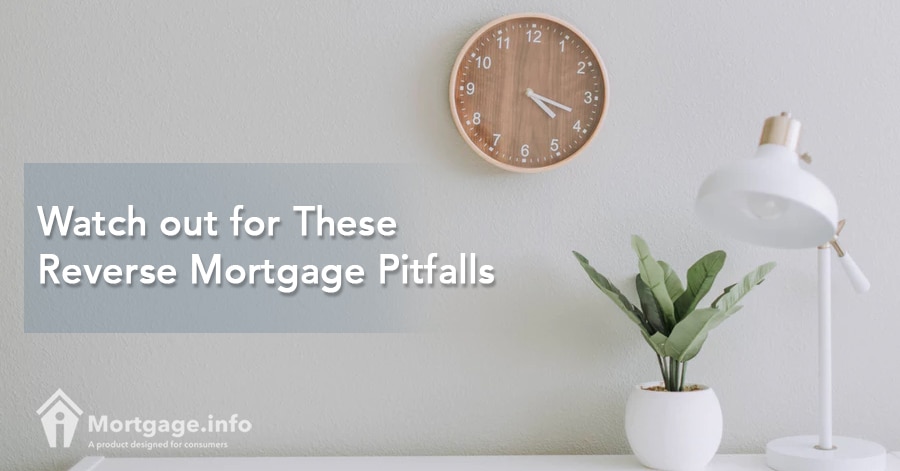
When you are hard up for money, a reverse mortgage can seem like a great idea. You get to take equity out of your home and you don’t have to repay it until you move out the home (or pass away). What’s not to love?
Get Matched with a Lender, Click Here.
Before you jump right into the reverse mortgage, you should know the pitfalls. We aren’t saying that it’s a bad loan, because it’s not. We just want you to be fully informed before you touch your home’s equity with a loan like this.
Don’t Wrap the Upfront Costs Into Your Loan
Many people don’t realize that the reverse mortgage accrues interest. Just because you aren’t making payments now doesn’t mean it doesn’t cost you to borrow the money. It’s not the interest that hurts borrowers, though. What hurts them is the amount that they borrow. Because there are upfront costs associated with the reverse mortgage, many people roll the costs into the loan. That could be a bad idea, though.
If you roll the costs of doing the reverse mortgage into the loan, they will compound interest every month that they go unpaid. What may have been closing costs of a few thousand dollars could now be many more thousands because of the interest that accrues. Even if you are only in the home for another five years that is five years of interest on closing costs that you could have paid up front.
In order to avoid this pitfall, make sure that you have the money to cover the closing costs on the loan. If you can’t afford the closing costs, then it might not be a good idea to take the loan.
Interest Rates Can Rise
Typically, you don’t get a fixed interest rate when you take out a reverse mortgage. The only exception is if you take your money out as one lump sum. If you are like most people and you take it in payments, you will have a variable interest rate. This means from one month to the next, you won’t know what interest rate you are paying.
Over time, the interest rate could increase significantly, which could eat away at your profits on your home. This is especially true if you took out a large chunk of your home’s equity. It’s best to keep the amount you borrow to a minimum and to keep the time that you have the money out as short as possible. This way you can reduce the risk of excessively high-interest rates and charges.
You Could Lose Your Home if you Don’t Pay Your Taxes
Even with a reverse mortgage, you are responsible for paying your property taxes and maintaining your home. If you neglect to pay your property taxes, your loan goes into default because you violated the terms of the agreement.
Click to See the Latest Mortgage Rates.
If this happens, the bank will demand payment in full right away. This means you either have to sell the home fast or lose the home in foreclosure. This is all because you couldn’t pay your property taxes. Now all of the money you paid into the home to own it free and clear could be gone.
You Must Live in the Home
Many seniors don’t realize that they have to live in the home as their primary residence in order to keep the reverse mortgage. The moment you move out of it because you moved into a nursing home, you violate the loan’s requirements.
If you don’t live in the home for 12 months in a row, the bank can demand payment in full right away. If you don’t come up with it, they can foreclosure on your home.
It Could Cause Trouble for Your Heirs
Your heirs are responsible for paying off the reverse mortgage upon your passing. If they are unaware of the mortgage or don’t agree with what should be done with the home upon your passing, it can cause some serious issues among the family.
In order to avoid this, make sure everyone knows about the reverse mortgage. Explain to your heirs that you need the money to supplement your retirement income. This way they will be prepared to pay off the loan when they sell your home upon your passing. If some heirs want to keep the home, they may be able to, but they will have to pay off or refinance the reverse mortgage into a traditional mortgage.
The reverse mortgage can be a blessing for seniors that are struggling to get by, but you have to have the means to pay your taxes and home maintenance in order to qualify. If you want to ‘age in place,’ the reverse mortgage can be a good way to do so. Just be careful with the terms, interest, and informing your loved ones of your decision.
